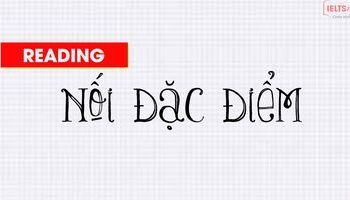Nhiều bạn mải ôn tập IELTS quá mà quên mất là mình đang đồng thời học một ngôn ngữ mới. Điều này thật là exciting phải không nào!
Ngoài tiếng Anh ra, mình cũng học thêm một vài thứ tiếng nữa, mặc dù chưa thành công như tiếng Anh, nhưng mình thật sự thích quá trình khám phá một ngôn ngữ và nền văn hoá mới. Chúng ta cùng khám phá một số từ vựng, câu trả lời về chủ đề này nhé.
Từ vựng chủ đề Ngôn ngữ
| Từ | Phiên Âm | Loại từ | Nghĩa |
| System | /ˈsɪstəm/ | (n) | Hệ thống |
| Phonetics | /fəˈnetɪks/ | (n) | Ngữ âm học |
| Phonology | /fəˈnɑːlədʒi/ | (n) | Âm vị học |
| Morphology | /mɔːrˈfɑːlədʒi/ | (n) | Hình thái học |
| Acronym | /ˈækrənɪm/ | (n) | Từ viết tắt |
| Affix | /əˈfɪks/ | (n) | Phụ tố |
| Allomorph | /ˈæləmɔːrf/ | (n) | Tha hình |
| Allophone | /ˈæləfəʊn/ | (n) | Tha âm vị |
| Ambiguity | /ˌæmbɪˈɡjuːəti/ | (n) | Từ nhiều nghĩa, đa nghĩa |
| Antonym | /ˈæntənɪm/ | (n) | Từ trái nghĩa |
| Compound sentence | /ˈkɑːmpaʊnd ˈsentəns/ | (n) | Câu ghép, câu phức |
| Conjunction | /kənˈdʒʌŋkʃn/ | (n) | Liên từ |
| Consonant | /ˈkɑːnsənənt/ | (n) | Phụ âm |
| Vowel | /ˈvaʊəl/ | (n) | Nguyên âm đôi |
| Descriptive linguistics | /dɪˈskrɪptɪv lɪŋˈɡwɪstɪks/ | (n) | Ngôn ngữ học mô tả |
| Prescriptive linguists | /prɪˈskrɪptɪv lɪŋˈɡwɪstɪks/ | (n) | Ngôn ngữ học quy định |
| Linguistics | /lɪŋˈɡwɪstɪks/ | (n) | Ngôn ngữ học |
| Etymology | /ˌetɪˈmɑːlədʒi/ | (n) | Từ nguyên học |
| Semantics | /sɪˈmæntɪks/ | (n) | Ngữ nghĩa |
| Determiner | /dɪˈtɜːrmɪnər/ | (n) | Từ hạn định |
| Digraph | /ˈdaɪɡræf/ | (n) | Từ ghép |
| Diphthong | /ˈdɪpθɔːŋ/ | (n) | Nguyên âm đôi |
| Homonym | ˈhɑːmənɪm/ | (n) | Từ đồng âm (khác nghĩa) |
| Homograph | /ˈhɑːməɡræf/ | (n) | Từ cùng chữ (phát âm và nghĩa khác nhau) |
| Inflect | /ɪnˈflekt/ | (v) | Biến cách |
| Morpheme | /ˈmɔːrfiːm/ | (n) | Hình vị học |
| Orthography | /ɔːrˈθɑːɡrəfi/ | (n) | Phép chính tả |
| Phoneme | /ˈfəʊniːm/ | (n) | Đơn âm |
| Phrase | /freɪz/ | (n) | Cụm từ |
| Clause | /klɔːz/ | (n) | Mệnh đề |
| Constituent | /kənˈstɪtʃuənt/ | (n) | Thành phần |
| Rhyme | /raɪm/ | (n,v) | Âm vần, ăn vần |
| Syllable | /ˈsɪləbl/ | (n) | Âm tiết |
| Syntax | /ˈsɪntæks/ | (n) | Cú pháp |
| Synonym | /ˈsɪnənɪm/ | (n) | Từ đồng nghĩa |
| Diachronic | /ˌdaɪəˈkrɑːnɪk/ | (adj) | Lịch đại |
| Displacement | /dɪsˈpleɪsmənt/ | (n) | Sự thế chỗ |
| Extralinguistic | /ɛkstrəlɪŋˈɡwɪstɪk / | (adj) | Ngoài lĩnh vực ngôn ngữ học |
| Metalanguage | /ˈmetəlæŋɡwɪdʒ/ | (n) | Siêu ngữ |
| Onomastics | /ˌɑːnəˈmæstɪks/ | (adj) | (thuộc) Nghiên cứu tên riêng |
| Metaphor | /ˈmetəfɔːr/ | (n) | Phép ẩn dụ |
| Paradigm | /ˈpærədaɪm/ | (n) | Hệ biến hóa |
| Parameter | /pəˈræmɪtər/ | (n) | Tham số |
| Reflexive | /rɪˈfleksɪv/ | (adj) | Phản xạ tốt |
| Sign language | /ˈsaɪn læŋɡwɪdʒ/ | (n) | Ngôn ngữ cử chỉ |
| Structuralism | /ˈstrʌktʃərəlɪzəm/ | (n) | Chủ nghĩa cấu trúc |
| Taxonomic | /ˌtæksəˈnɑːmɪk/ | (adj) | (thuộc) Sự phân loại |
Useful Nouns
Native tongue: tiếng mẹ đẻ
Dialect: tiếng địa phương
Verbal communication: giao tiếp bằng lời
Useful Verbs
Be fluent in: nói lưu loát tiếng gì đó
Converse: một từ formal hơn cho speak
Chat: tán dóc
Useful Adjectives
Understandable: có thể hiểu được
Unintelligible: lời nói dễ hiểu
Meaningless: vô nghĩa
Useful Idiomatic Expressions
Have a chinwag = have a conversation: nói chuyện đối thoại
All Greek: dùng để nói một ngôn ngữ mà bạn hoàn toàn không hiểu
Bây giờ, hãy cùng tìm hiểu mội số bài mẫu Speaking về chủ đề này nhé!
Sample Part 1
1. Do you like learning languages?
A: Yes, I do like learning languages. I like English as a second language more than my native tongue and spend a lot of time practicing on it. I have also started to learn French recently.
What foreign languages have you studied?
Well, in Vietnam, everyone must learn English at school, and I am no exception. On top of that, I have taken some courses in Japanese and Chinese as a hobby. I must say that I am really interested in learning new languages as it helps me broaden my horizons.
2. Why did you choose to study that language?
Well basically, English is a compulsory subject in our education system and it has become a global language of communication and is widely used in many aspects of life, such as education, business, and travel. On top of that, I chose Japanese and Chinese because of its prevalence in my country and its rich cultural and historical significance.
3. How did you learn the languages that you know?
A: I think the most effective way to learn a language is to practice more with a native speaker. By doing this, you can improve both listening and oral skills simultaneously, you will be fluent in this language. Besides, I also do general readings in my spare time and keep a journal in English.
How did you learn that language?
Well, I learned English primarily through formal education, starting from primary school and continuing into higher education. I supplemented my language learning through reading books, watching movies, and practicing conversational skills. For Japanese and Chinese, I initially learned the basics through immersion like watching movies, listening to music, or taking language courses, and further improved through practice with native speakers.
4. Why do people learn more than one language?
A: I think people learn as many languages as they can because language is a necessary tool to have conversations with foreign people and learn their cultures. Understanding many languages helps us to open the door of many more opportunities in this world.
5. Do you think that all children should learn foreign languages at school?
A: Yes, I think that kids are better at learning a second or more foreign languages at school. They learn things fast at a young age, and I’m certain that a mastery of other languages pays well for kids when they go into the adult world in the future.
6. How long have you been learning that language?
Well, if I remember correctly, I have been learning English since my early childhood, and I have been studying Chinese and Japanese for approximately 3 years.
7. Would you say it’s a difficult language to learn?
Well, learning a language can be challenging, but with consistent practice and dedication, it becomes more manageable. English has many irregularities in grammar and pronunciation, while Japanese and Chinese require us to master logographic characters, that is, every symbol either represents a word or a minimal unit of meaning. Although those languages have their complexities, they are widely taught and learned worldwide.
Sample Part 2
Describe a language that you want to learn (not English)
Skill-developing exercises
1. Lexical resource
Bài 1: Cho dạng đúng của những từ trong ngoặc để tạo thành một đoạn văn hoàn chỉnh và có nghĩa.
Currently I am a student (1) (major) ___________ in Italian so I want to learn another language that has a different alphabet and Chinese is the language that (2) (come) ___________ to my mind first. To me, speaking Chinese (3) (fluent) ___________ is a good way of being a part of that interesting (4) (Orient) ___________ culture.
2. Grammar
Bài 2: Đoạn văn sau có 5 lỗi sai. Hãy tìm và sửa chúng.
First, Chinese culture is a vivid one, which is a combination of breathtaking scene, succulent local cuisine and great music.
I am a kind of person who like to read about Western culture. Therefore, China may sound an attractive language and I think learn Chinese can help me have a deeper insight into the root of this civilization. In other words, I can understand people’s etiquettes and especially the tradition customs.
(1)__________________________
(2)__________________________
(3)__________________________
(4)__________________________
(5)__________________________
3. Pronunciation
Bài 3: Dựa vào những phiên âm sau, hãy viết từ hoàn chỉnh.
- /ˌsɪv.əl.əˈzeɪ.ʃən/ ___________________________
- /ˈet̬.ɪ.kɪt/ ___________________________________
- /ˈbreθˌteɪ.kɪŋ/ ___________________________
- /əˈtræk.tɪv/ _____________________________
- Coherence
Bài 4: Lựa chọn phương án chính xác để làm cho đoạn văn sau logic.
Second, learning Chinese is beneficial nowadays. The (truth/ confession/ real) is that there are an (declining/ even/ increasing) number of China’s entrepreneurs that have invested in Vietnam. I think it is a good opportunity for me (though/ along with/ because) I can apply to some groups with my Chinese language skill. Learning Chinese can be a great help with my future career.
Đáp án:
Bài 1:
(1) (majoring)
(2) (comes)
(3) (fluently)
(4) (Oriental)
Bài 2:
(1) once => one
(2) scene => scenery
(3) Western => Eastern
(4) learn => learning
(5) tradition => traditional
Bài 3:
- civilization
- etiquette
- breathtaking
- attractive
Bài 4: truth – increasing – because
Sample answer
Cue card
Describe a language that you want to learn (not English).
You should say about:
- What it is;
- Why it is interesting to you;
- How it will help you.
Suggested answer
| Describe a language that you want to learn (not English). | |
| Answer
| Currently I am a student majoring in Italian so I want to learn another language that has a different alphabet and Chinese is the language that comes to my mind first. To me, speaking Chinese fluently is a good way of being a part of that interesting Oriental culture. |
| Reason
| First, Chinese culture is a vivid one, which is a combination of breathtaking scenery, succulent local cuisine and great music. |
| Example
| I am a kind of person who like to read about Eastern culture. Therefore, Chinese may sound an attractive language and I think learning Chinese can help me have a deeper insight into the root of this civilization. In other words, I can understand people’s etiquettes and especially the traditional customs. Specifically, I can learn more about their practices, habits and see the interesting similarities and differences between Chinese and Vietnamese culture. |
| Reason | Second, learning Chinese is beneficial nowadays. |
| Example | Going to China to study is the dream that I have had for quite a long time. Therefore, learning Chinese is not only beneficial, it is necessary for my study. If I can speak it fluently, I may adapt better to the environment and students around me. Moreover, the truth is that there are an increasing number of China’s entrepreneurs that have invested in Vietnam. I think it is a good opportunity for me because I can apply to some groups with my Chinese language skill. Learning Chinese can be a great help with my future career. |
Useful expressions
Vocabulary
| New words | Meaning | Synonyms |
| Oriental culture (n) /ˌɔːr.iˈen.t̬əl ˈkʌl.tʃɚ/ | văn hóa phương Đông | Eastern culture (n) It is important that we learn about the special patterns in Eastern culture. |
| vivid (adj) /ˈvɪv.ɪd/ | đa sắc màu |
|
| breathtaking scenery (n) /ˈbreθˌteɪ.kɪŋ ˈsiː.nər.i/ | khung cảnh tuyệt đẹp | |
| succulent (adj) /ˈsʌk.jə.lənt/ | ngon | delicious (adj) /dɪˈlɪʃ.əs/ Nothing is better than going to a foreign country and enjoying delicious street food. |
| local cuisine (n) /ˈloʊ.kəl kwɪˈziːn/ | ẩm thực địa phương |
|
| apply (to) (v) /əˈplaɪ/ | ứng tuyển | |
| traditional custom (n) /trəˈdɪʃ.ən.əl ˈkʌs.təm/ | phong tục truyền thống | |
| etiquette (n) /ˈet̬.ɪ.kɪt/ | cách ứng xử |
Structures
| St comes to one’s mind (cái gì nảy ra trong đầu) | Austria is the first country that comes to my mind in terms of the place I want to live in the future. |
| have a deeper insight into (có hiểu biết sâu hơn về cái gì) | Mrs. Le is the person who helps me have a deeper insight into Vietnamese literature. |
| the root of this civilization (gốc rễ nền văn minh) | The root of Maya civilization may start thousands years ago. |
| There are an increasing number of St (có một số lượng tăng lên của cái gì) | There are an increasing number of dwellers in Ho Chi Minh city nowadays. |
Các bạn cùng tham khảo và áp dụng nhé. Xem thêm bài viết hay mỗi ngày cùng ielts-fighter.com.
Tài liệu biên soạn bởi IELTS Fighter, vui lòng ghi nguồn nếu chia sẻ.
Đặc biệt là ngay trong tháng này thì IELTS Fighter hiện đang có chương trình ưu đãi học phí siêu hấp dẫn cho các bạn học viên mới, đừng bỏ qua nhé:





